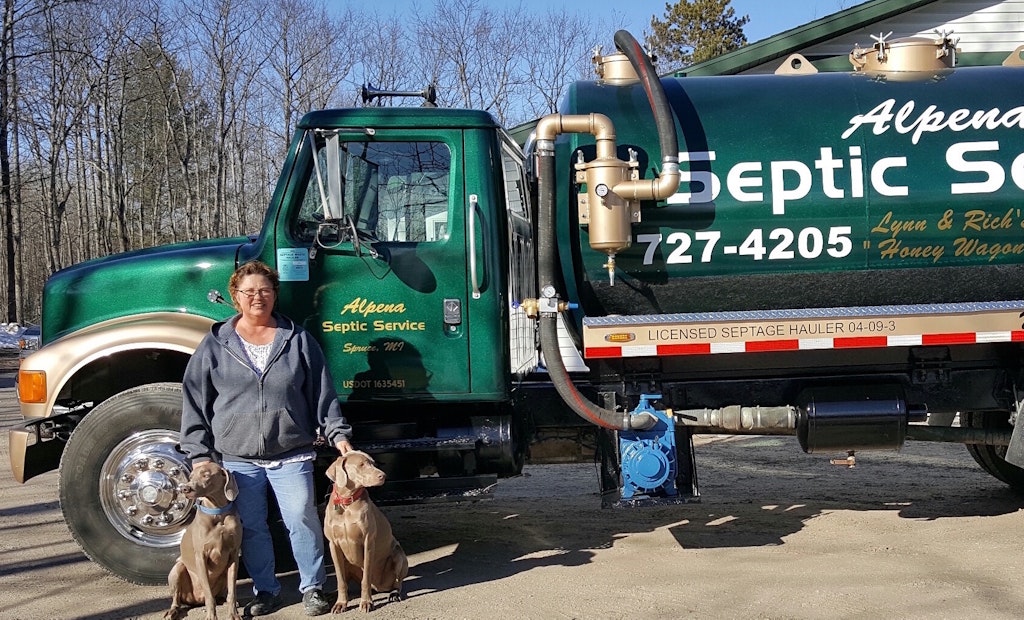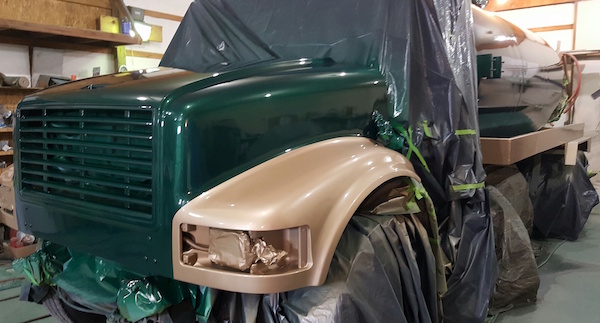
Interested in Pumps?
Get Pumps articles, news and videos right in your inbox! Sign up now.
Pumps + Get AlertsRichard and Lynn Gillespie have been busy the past 10 years. Since the last time Pumper magazine spoke to them, they’ve added trucks, employees and municipal work to Alpena Septic Service, based out of Spruce, Michigan.
The Gillespies saw significant growth in a decade, showcasing the pumping trade’s resiliency to economic recession and the rewards business owners can see in return for good old-fashioned hard work. But not everything changed.
Richard says they’re still fighting as members of the Michigan Septic Tank Association to have a voice in septage regulations, and they’re still working on getting Michigan to establish a standardized septic code in place of the dozens upon dozens of different sets of rules throughout the state.
“We just had a meeting on it,” says Richard. “We’re the only state that doesn’t have a sanitary code. The sanitarians are fighting the state because they don’t want a sanitary code. It’s not a smooth transition. They’re dead set against it, and they don’t care for the Michigan Department of Environmental Quality.”
The Gillespies are still land-applying their septage, thanks to an investment they made in 2007 to install a glass-lined, 100,000-gallon Slurrystore storage tank from CST Industries. A time constraint on the project made it risky when Pumper magazine last talked to the couple. As long as they had it approved before the municipal treatment plant in the area was ready to accept waste, they’d be allowed to land-apply until 2025.
As soon as other haulers in the area gave up their land sites, the treatment plant south of Alpena, Michigan, raised its discharge fee from $55 per 1,000 gallons to $80 in 2007. The Gillespies anticipate that fee could increase again before this year is through.
Building business
The Gillespies might be running the same company on the same property as 10 years ago, but they’ve greatly expanded. “We bought 10 acres and two extra pole barns that we converted into heated workshops,” says Richard. “We expanded, and all our heated trucks are under cover in the winter.”
The company also expanded into municipal work and has added five full-time employees. “Now, we have an industrial waste hauling license because city waste is classified as liquid industrial waste in the state of Michigan,” says Richard. “Following that, we expanded into camera work."
Versatility is key in the Alpena area, according to Lynn. “When you get up here in the North, you have to be able to do more than one thing or two things,” she says. “You have to be able to adapt to make money year-round.”
Ten years ago, the Gillespies only had one truck. Today, they have three pumper trucks, a city sewer truck and two portable restroom trucks. “We’ve worked our butts off,” says Lynn.
Classy refurb job
One of the coolest trucks in the fleet is a renovated 1995 International with a brand new 2,500-gallon tank made by Marengo Fabricated Steel Ltd. It’s a great looking truck — and not just for a more than 20-year-old vehicle.
The credit goes to some quality in-house body work. “When I had a real job before I was self-employed in the septic business, I was an auto body worker in Lower Michigan for 17 years,” says Richard. “So, I started out as a painter when I was 18 doing a vocational program. My employee Robert is an excellent welder and is a certified mechanic. He has excellent fabrication skills.”

Richard Gillespie and an employee did all the body work on the 1995 International themselves.
Lynn says the 1995 International is nice for smaller pumping jobs. “It’s a really good truck, and the engine is good and tight.” That engine is International’s DT466 inline six-cylinder turbodiesel. The truck also has a six-speed transmission and a Jurop/Chandler R260 vacuum pump.
The Gillespies bought the International used, and it looked like the previous owner had never driven it in the winter. “So there was no corrosion from salt on the cab and chassis,” says Richard. “It’s a simple truck before computers, meaning it’s actually something we can work on ourselves without taking it to a diesel shop. It works out for us, too, because it’s a simple truck to drive when we’re training employees to get their CDLs.”
As part of the refurb job, they installed a new 18-by-18-by-48-inch aluminum toolbox. “That replaced an old aluminum box on the truck that was getting a little grungy,” says Richard. “Everything else is new on the truck, so we figured why stop there?”
Even though the truck is 22 years old, the Gillespies manage to keep it looking nice and new. “The best words to describe this truck are 'brand building,'” says Richard. “You see a lot of white septic trucks or red septic trucks; you don’t see too many green and gold ones. It’s a nice clean unit. It just makes the whole industry looks better, and they notice if you keep them clean and shiny. You’ll be recognized by your truck sometimes.”





